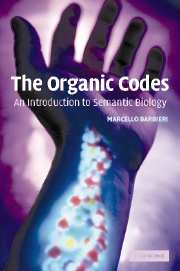Book contents
- Frontmatter
- Contents
- Foreword
- Dedication
- Acknowledgements
- Introduction
- Chapter 1 The microscope and the cell
- Chapter 2 Theories of evolution
- Chapter 3 A new model for biology
- Chapter 4 Organic codes and organic memories
- Chapter 5 The origin of life
- Chapter 6 Prokaryotes and eukaryotes
- Chapter 7 The Cambrian explosion
- Chapter 8 Semantic biology
- Chapter 9 A brief summary
- Appendix: Definitions of life
- Afterword
- References
- Index
Chapter 9 - A brief summary
Published online by Cambridge University Press: 23 November 2009
- Frontmatter
- Contents
- Foreword
- Dedication
- Acknowledgements
- Introduction
- Chapter 1 The microscope and the cell
- Chapter 2 Theories of evolution
- Chapter 3 A new model for biology
- Chapter 4 Organic codes and organic memories
- Chapter 5 The origin of life
- Chapter 6 Prokaryotes and eukaryotes
- Chapter 7 The Cambrian explosion
- Chapter 8 Semantic biology
- Chapter 9 A brief summary
- Appendix: Definitions of life
- Afterword
- References
- Index
Summary
Semantic biology has been developed in stages since the 1970s. The mathematical papers appeared in 1974 and 1987 (Barbieri, 1974a, 1974b, 1987). The first biological paper was “The ribotype theory on the origin of life” (Barbieri, 1981) and the first general theory (the concept of evolution by natural conventions) was proposed in The Semantic Theory of Evolution (Barbieri, 1985). The idea that splicing and signal transduction are based on organic codes was introduced much later (Barbieri, 1998), and so was the term semantic biology (Barbieri, 2001). There are at least five new concepts in this biology (ribotype, organic codes, organic memories, reconstruction from incomplete information and evolution by natural conventions), and they have all gone unnoticed for a long time. Something similar happened to the ideas of Edward Trifonov, who has been calling attention to sequence codes since 1988, and perhaps that was not a coincidence. Things however seem to be changing. The discoveries of the sugar code (Gabius, 2000) and of the histone code (Strahl and Allis, 2000; Turner, 2000) have made some impact, and there is a growing awareness that real organic codes do exist in nature. A parallel development has also taken place in philosophy and in linguistics. In 1963, Thomas Sebeok proposed that semiotics must have a biological basis, and has campaigned ever since for a more general approach which today is known as biosemiotics (Sebeok, 2001).
- Type
- Chapter
- Information
- The Organic CodesAn Introduction to Semantic Biology, pp. 243 - 254Publisher: Cambridge University PressPrint publication year: 2002



